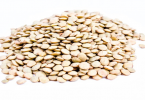Typical for the American family, your dog is most likely to be more like a family member instead of simply a pet. Treating your dog as a member of the family is true for more than 44% of all Americans. As the summer is right around the corner, you are likely to be looking forward to some sweet frozen ice cream. Ice cream is a summer staple (enjoyed all year) and the bell of the ice cream truck is hypnotizing. While we love our ice cream as humans, may e share our love with our dogs? Is it safe for you to share some of this sweet goodness with your beloved furry companion? Can dogs eat ice cream?
Can Dogs Eat Ice Cream – Not Recommended
You may be surprised to know that something as apparently harmless as ice cream can cause severe health risks to your dog. This is because dogs do not have the essential enzymes for breaking down the lactose found in dairy products. Ice cream may seem to be a simple type of food, but the milk that creates the ice cream is not. Dogs drink milk from their mothers when they are born, but dogs do not drink milk from cows or goats. Without the ability to digest milk from any source other than their mother’s, dogs can run the risk of sickness by ingesting the milk of a cow.
Your dog will typically want to eat anything and everything you are having, but the greater responsibility of what he gets to eat lies with you. Eating ice cream can make your dog sick. Your dog is unaware of the risks involved with eating ice cream and may also not remember the last time s/he had ice cream and vomited for hours along with having stomach cramps. You are the holder of this information and should keep these facts in mind when your dog begins to beg for a lick. Your furry friend may likely to get diarrhea, vomit, and have gas-the severity of which depends on how much the dog eats and how frequently.
Why Is Ice Cream Bad For Your Dog?
Some may write off the warnings of serving ice cream to your dog with a ‘bah humbug’ attitude, but reading about the actuality of ice cream ingredients may better help you in making the decision or yourself. Developing a better understanding of why ice cream and other dairy products are likely to cause your dog health issues will enable you to develop better understanding about the entire issue surrounding ice cream. What ingredients does ice cream contain?
Ice cream is loaded with fat, sugar and lactose. If your dog is lactose intolerant, he will get bloated and experience grave discomfort to the extent that you will have to take him to the vet. Additionally, a dog has greater chances of getting diabetes if he consumes too much sugary food, and this illness can shorten your canine’s lifespan. Diabetes is usually associated with humans, but animals are also at risk of developing this disease. Dogs have not evolved enough to have digestive systems that break down sugar efficiently or use the use sugar wisely. Sugar will simply make your dog overweight and possibly sick.
Lactose is formed of molecules of sugar which are connected chemically. When your dog eats food with lactose content, he has to break the sugar molecules apart using the enzyme known as lactase. This is true for ice cream and all other foods that contain lactose. Dogs are often unable to produce lactase due to which they become lactose intolerant and experience severe intestinal symptoms. Milk used in ice cream is one of the ingredients that will give the dog the most grief. Dogs are not meant to break down the lactose in this type of milk. Even lactose free milk used in ice cream can make a dog ill though.
If your dog does get an occasional ice cream, the safest type of ice cream to offer is vanilla. Raisin and chocolate flavors are never to be given to dogs as both of these elements are toxic for canines. The raisins and chocolate itself are poisons to dogs, adding the toxins into an ice cream treat with lactose will only do damage to your dog and cause undue suffering.
When one thinks of vanilla ice cream, one may think of a classic ice cream cone. Do not offer your dog an ice cream cone no matter how cute you think the offering is! Ice cream cones are even more harmful for dogs than regular ice cream and can cause serious health issues. Additionally, there is likely to be additional sugar in both foods.
The high sugar content in ice cream is another reason why ice cream is unsafe for your dog. Not just ice cream, any snacks with high sugar content are harmful for dogs. Fats are equally harmful as well. Added sugar is never a good idea for a dog, so be careful in the event you offer ice cream. Added fat is just as bad for dogs as is for humans. Combining the added fat and sugar, and your dog could very well develop the health problems humans develop when consuming an unhealthy diet.
Ice cream also contains salt and artificial sweeteners, both of which are not good for dogs. Artificial sweeteners have been known to cause adverse reactions in humans, and the chemicals can also cause harm to your pup. The best way to avoid the sugar, fat, lactose, and sweeteners, is to develop your own ice cream made from natural ingredients that will not harm the health of your dog. Farmers and boutique dog food stores may offer this treat to sell; however, you can also make the ice cream at home if you simply must offer the treat to your dog.
Which Ice Cream Related Health Problems Dogs Are Likely To Have?
The three issues that are most likely to occur if your dog eats a large serving of ice cream or eats it too frequently, are gas, vomiting and diarrhea. If you observe these symptoms in your dog after eating any dairy product or foods made with cow’s milk, it is most likely that your pet is intolerant to lactose. Lactose intolerance can be inherited genetically or may develop over time due to poor eating habits. The intolerance is especially in common in dogs since the need to digest milk from animals other than their mothers have not been developed.
If your dog eats a large quantity of ice cream on accident, do not panic. Observe your dog carefully for the next few hours and make note of any sudden changes or gradual disturbances. The reaction to ice cream may come up quite soon; you may not need to wait an extended period of time. You may also wish to put the dog outside or in a non-carpeted area that is easy to clean in the event of a sickness. Keep the number of your local vet on hand just in case your dog is in distress and must go for an emergency doctor visit.
There is a possibility that your furry pal may get better on his or her own once the bothersome food is out of the digestive system. The body will purge itself automatically of the unfamiliar foods and after the waste is removed, the body will deem the stomach toxin free and begin to heal. However, if your dog does not revert to his or her usual behavior and the illness gets worse, you must take him to the vet right away.
Many people may argue that ice cream should be given to dogs because cheese is given to fogs. However when in comparison to ice cream, cheese has quite lesser amounts of lactose content. Cheese will not upset the stomach of your dog as much as ice cream, and there are actual nutrients in cheese that a dog may benefit from more so than ice cream. If you do wish to feed your dog dairy products as treats, cheese is a better option due to the lower content of lactose. Dogs can also handle yogurt. Frozen yogurt may be an acceptable treat for your dog in the event s/he will not take ‘no’ for an answer in regards to ice cream.
The Good News – Doggie Ice Cream!
The good news is that doggie ice cream is now available in many places. This has come about due to the extensive protests by dog lovers and the increased demand for frozen treats that are safe for dogs. You can even look for recipes online and make ice cream that is safe to be given to dogs without causing any harm to their health. But when it comes to regular ice cream, it is an entirely different story.
Final Thoughts
Even if your dog does not experience digestive issues after eating ice cream, you may still want to limit the quantity and frequency as the high sugar content can lead to long-term health issues. An occasional lick of an ice cream cone, or the left over melted ice cream in the bottom of a bowl might not cause a deadly reaction, per se, but be mindful of the habit and taste you are teaching your dog. Just as teaching a child not to eat sweets, you should not teach your dog to eat human ice cream either. So the answer to the previous question is no, dogs should not have ice cream. But dogs MAY have all natural homemade ice cream created just for dogs.
References:
https://www.yahoo.com/style/canine-friendly-ice-creams-for-the-dog-days-of-126360351046.html
http://doghealthnews.com/can-dogs-eat-ice-cream-why-lactose-is-bad-for-your-dog/
http://www.petful.com/pet-health/dog-ice-cream-cones/
http://mom.me/pets/dogs/17932-10-surprising-people-foods-dogs-can-eat/









Leave a Comment